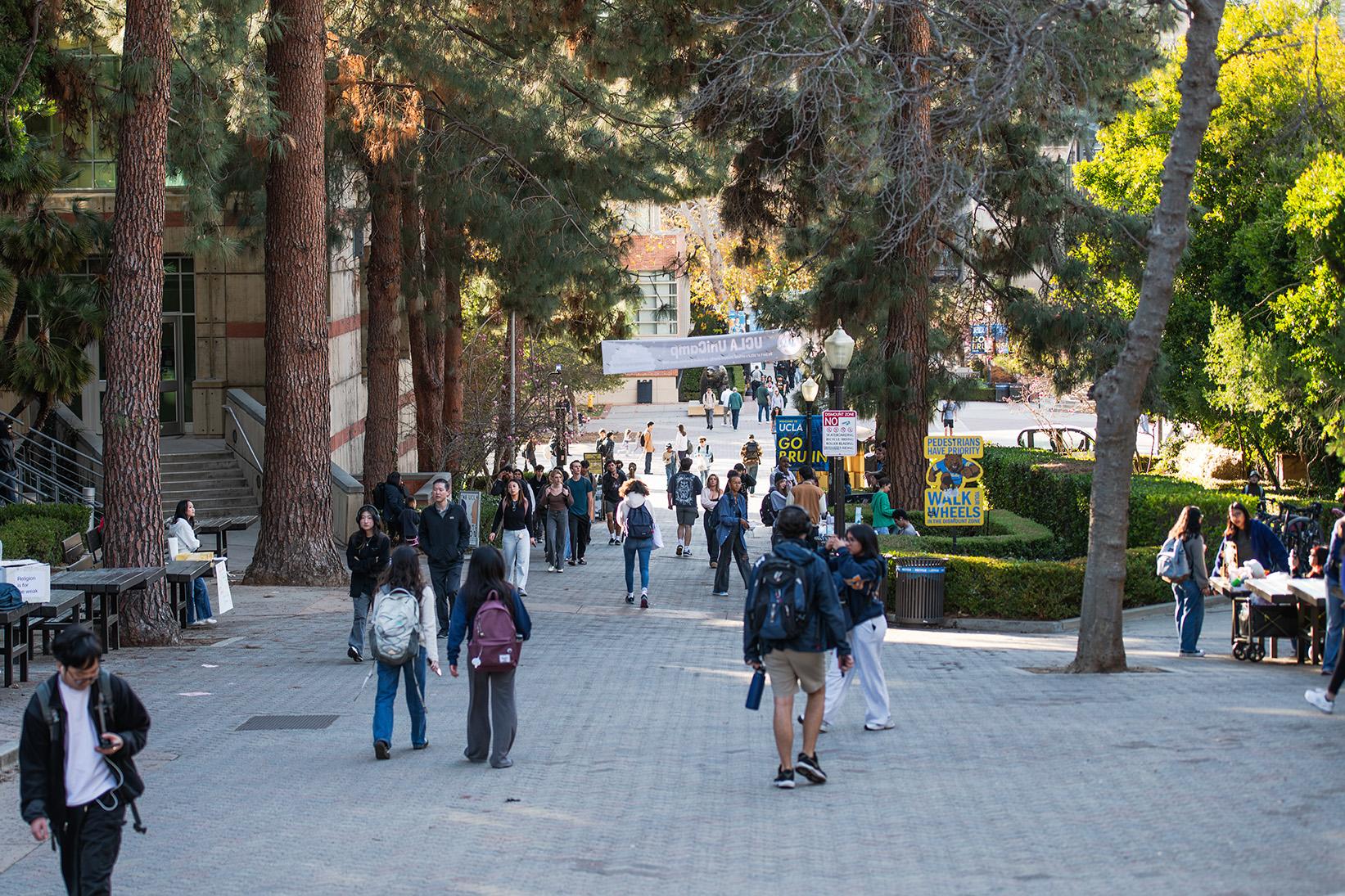UCLA students react to Trump’s attacks on higher education, federal funding cuts
Students walk down Bruin Walk. Students said UCLA should fight back against the Trump administration’s attacks on higher education. (Alexandra Crosnoe/Daily Bruin senior staff)
This post was updated May 16 at 12:35 a.m.
Students said UCLA should fight back against the Trump administration’s attacks on higher education.
The United States Department of Education has withheld funding from Brown University, Columbia University, Cornell University, Harvard University, Northwestern University, Princeton University and University of Pennsylvania since the beginning of the Trump administration.
According to a letter from the Department of Education addressing Harvard leaders, the funding cuts are a reaction to how the university “failed to live up to both the intellectual and civil rights conditions that justify federal investment.”
The department notified Harvard University on April 11 that, unless the university complies with the list of conditions – making leadership changes, reforming its approach to alleged antisemitism and discontinuing diversity, equity and inclusion policies – it would freeze $2.2 billion in federal grants and $60 million in contracts. Harvard rejected its conditions, becoming the first American university to do so.
Magomed-Gusein Gasanov, an international graduate student at the UCLA School of Law, said he was hoping to express himself freely in the U.S., but now he and his peers fear deportation if they speak out.
“I came from Russia – when I came, I (thought), ‘Oh, finally, there is an atmosphere of freedom, I can express myself,’ and now I’m like, ‘I have to shut up again,’” Gasanov said. “My classmate from Russia, she was like, ‘I’m not sure whether I should do that interview because I can be deported if I say something wrong.’”
UCLA is yet to release a statement condemning the Trump administration. However, Chancellor Julio Frenk joined an April 22 letter by the American Association of Colleges and Universities condemning government overreach in higher education and affirming the importance of academic freedom.
“We must oppose undue government intrusion in the lives of those who learn, live, and work on our campuses,” the college leaders said in the letter. “We must reject the coercive use of public research funding.”
However, other schools, including Columbia, have complied with Trump administration demands to regain their funding. The university hired 36 special officers who now have the power to arrest students, have banned protesters from wearing masks and will review procedures to “ensure unbiased admission processes” as requested by the Trump administration, according to a Columbia statement.
Cierra Anguiano, a second-year political science student, said she hopes UCLA will align with Harvard’s position and reject potential federal demands.
“It would be awesome if we would follow suit with Harvard, just because they’re taking more of a stand and not just accepting what’s being thrown at them,” Anguiano said. “Complying doesn’t solve any issues – I think it actually makes further problems.”
Anguiano also said the federal funding cuts in question would disproportionately affect students of color, students with disabilities and students with nontraditional backgrounds. She added that without certain resources, the students would have never had access to education in the first place.
Katie Vaca, a fourth-year molecular, cell and developmental biology student, also said she believes UCLA should follow Harvard’s example. However, she added that rejecting federal requests may present more complications since UCLA is a public institution. According to UCLA Government and Community Relations, UC students receive about $1.6 billion in federal aid.
Vaca added that the university’s police presence on campus raises concerns for undocumented students and international students.
“As a school, this should be your safe space – a place to learn safely without having to worry about police showing up,” Vaca said.
[Related: Three pro-Palestine protesters arrested during encampment attack anniversary rally]
Arianna De Luna, a fourth-year molecular, cell and developmental biology student, said she fears finding a job in research after graduation because of federal funding cuts.
The National Institutes of Health announced it would cap indirect costs for its grants at 15%, but a federal judge blocked the policy April 4. However, the NIH appealed in response, continuing the ongoing legal battle.
“It’s really putting a halt on a lot of people’s futures,” De Luna said.
[Related: UCLA researchers express concerns on academic funding cuts, NIH indirect costs cap]
Anguiano said she has concerns about how UCLA would respond if put in a similar situation as Columbia.
“A lot of different schools are kind of just complying and not really fighting,” Anguiano said. “I feel like UCLA specifically has a very mixed history of when it chooses to fight for its students and chooses to just be compliant – so the fear is not knowing exactly how UCLA would react to it.”
Anguiano also said UCLA should improve its communication with students and take a more interactive approach instead of sending out “mass emails.” She added that she believes there should be more transparency about events affecting students.
“I feel like a lot of times we’re getting sugar-coated information,” Anguiano said. “It feels like sometimes we’re being fed things for their own narrative, rather than specifically the truth. I would much rather get the truth.”
